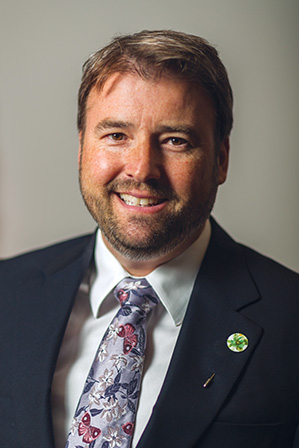A Fresh Start
State VP Voice
BY KENNETH KERO-MENTZ

Well, that was fast. With the drop of a tweet, Secretary Rex Tillerson was out.
As this column goes to press, Mike Pompeo has just been confirmed. It’s a good time to reflect on a number of the issues AFSA has been working on over the past year, and what we hope can be resolved once the 70th Secretary of State and his team are up and running.
Redesign: Do it right, or don’t do it at all. When Secretary Tillerson arrived, despite the fact that he admitted that he did not “know anybody in the State Department,” he decided that we were long-overdue for an “employee-driven” redesign. We’re not sure what will happen with all the ideas considered by the since-renamed “Impact Initiative,” but I’ve met with a lot of people who either gave suggestions or actually worked on the redesign. A lot of ideas were put forth by a lot of really earnest folks working to make the department a better place. And while the roll-out, roll-back and reworking of the redesign was messy, the department should always strive to improve the efficiency and effectiveness of our work to achieve our global mission.
Hiring Freeze: Lift it, please. Let’s face it, the freezes and partial thaws have been a disaster. The number of Foreign Service officers and specialists hired since February 2017 is at an all-time low. Employment opportunities for civil servants, eligible family members (EFMs) and reemployed annuitants (REAs) were slashed, making the work of the State Department more difficult and more dangerous.
One small example is MED, which is so understaffed that the most courageous of efforts is insufficient to manage the backlog of work or even staff key posts overseas. And what about all those serving around the world who are spending parts of their days doing not just their own work, but also the work for which post would typically hire an EFM? It’s high time to end the freeze and return to planned hiring levels, period.
Promote the Best: We’re an “up or out” system, after all. In 2017 promotion numbers were way down across the board, particularly for FSOs and especially for those entering or in the Senior Foreign Service.
If last year was an aberration, the damage done (including to morale) from that one year should be minimal. If it continues, excellent officers and specialists will begin to hit their “time in class” ceilings, and that will be a real loss to this institution we love. With low promotion rates and, in addition, the large number of retirements—especially from the senior ranks—over the past year, it is urgent that State promote the next generation of leaders. Make full use of their talents and experience; that’s what we’re here for.
Our department functions best when our employees are respected and engaged, from ambassador to new hire.
SNEA: It’s time for a change in how the Special Needs Education Allowance is managed. The most heartbreaking and hair-pulling stories we hear are from members whose families and careers have been turned upside down over the past two years due to MED’s non-review of this program, which supports the education of children with special needs.
Simply put, we need a program that is family-friendly and supports parents and children so we can do what we were hired to do—serve overseas. Life in the Foreign Service is already tough, and MED should be providing assistance and support, not roadblocks.
Engage AFSA: We’re here to help, honestly. AFSA and the department collaborate to resolve issues, both big and small. Whether it’s discussing post traumatic stress disorder or the need for lactation rooms at the Foreign Service Institute, or how to improve the 360-reference program for bidding, or how to soften the blow to those pulled out of posts for myriad reasons, AFSA is here to help. We understand the nature of our business, the expected hardships and unexpected challenges. We can offer useful ideas, ensure our members’ concerns are heard and provide valuable insight.
My list could go on, but our new Secretary already has a lot on his plate—critical challenges on a global scale. We wish him well. I wish him well. Whether officer or specialist; whether married, part of a tandem couple or single; whether early in one’s career or getting close to retirement, the men and women of the State Department are here to work.
We hunger for leadership, vision and purpose. Our department functions best when our employees are respected and engaged, from ambassadors to new hires. It’s what good leadership is all about, and it’s what the American people deserve.

